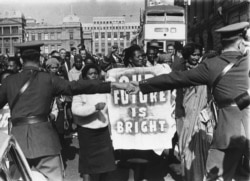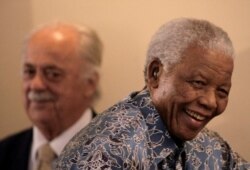South Africans are mourning the death of anti-apartheid activist and attorney George Bizos, best known for his role as defense lawyer for South African icon Nelson Mandela.
Bizos’ family said Thursday that the Greek-born lawyer, who came to South Africa as a refugee during World War II, died late Wednesday, “peacefully at home of natural causes, attended to by family.” He was 92.
In a statement Wednesday, President Cyril Ramaphosa described Bizos as “the legal eagle of our country.”
Bizos defended Mandela and others in the so-called Rivonia Trial of the 1960s, named for the location where the defendants had been arrested, which saw Mandela and companions sentenced to long prison terms for their roles in fighting the racist apartheid system.
After Mandela was released from prison and elected the nation’s first Black president, Bizos played a role in crafting one of the world’s most progressive constitutions.
“George Bizos is one of those lawyers who contributed immensely, immensely to the attainment of our democracy,” Ramaphosa said.
News of his death prompted an outpouring of sentiment from the highest levels of South African government and society.
“Mr. Bizos, who represented Walter Sisulu and Nelson Mandela during the infamous Rivonia Trial of 1963, will be remembered as one of the greatest proponents of human rights, social justice, and equality,” National Assembly Speaker Thandi Modise and National Council of Provinces Chairperson Mr. Amos Masondo said in a joint statement.
“With his tactical skills and a remarkable grasp of the law, he defended many anti-apartheid activists with integrity, passion, and resoluteness against a regime hellbent on persecution, killings, and destruction of Black lives,” they said.
Bizos met Mandela while the two were studying law at the University of the Witwatersrand.
After he defended Mandela in the Rivonia trial, he continued to offer support, with Mandela once saying that Bizos had “behaved like a brother” to him while he was in jail, helping Mandela maintain communication with the exiled leaders of the then-banned African National Congress.
Mandela went on to lead the ANC to victory in the nation’s first democratic election, in 1994.
Bizos memorably refused to take a seat in Mandela’s post-apartheid government, choosing instead to devote his time to overhauling the nation’s justice system. He appeared before the nation’s six-year Truth and Reconciliation Commission on behalf of families who had lost loved ones to the anti-apartheid struggle.
He also played a pivotal role in South Africa’s decision to ban the death penalty, in 1995. in his later years, he led a legal team seeking justice for victims of the 2012 Marikana massacre, where police killed 34 miners who were on strike, the worst single incident of police brutality in South Africa since the end of apartheid.
The head of the Nelson Mandela Foundation, Sello Hatang, said in a statement that Bizos stands shoulder to shoulder with Mandela, a man many South Africans refer to by his clan name, Madiba.
“At a moment like this,” Hatang said, “we remember Madiba and a whole generation of South Africans who endured much and achieved more. We owe it to them to keep walking that long walk to freedom."












